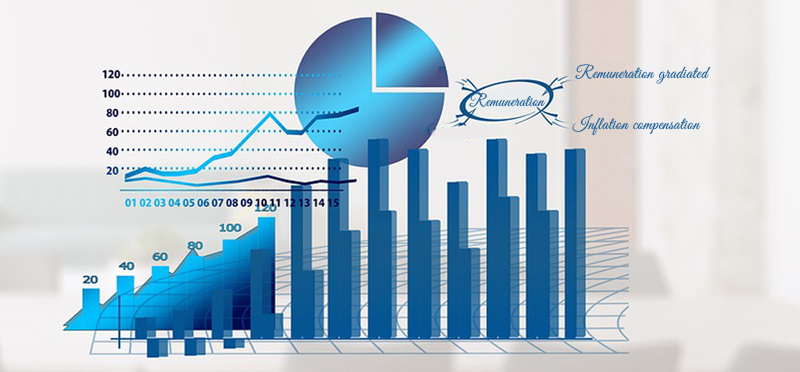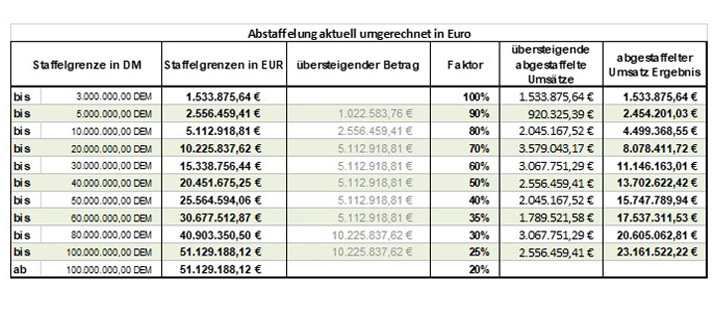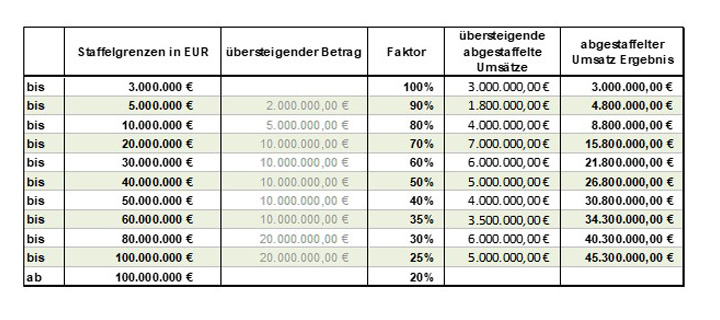Turn-around proposed: Inflation compensation for staggered reducted remuneration

With the current proposals for agreement Arb.Erf. 64/20 und Arb.Erf. 27/19 of an employee invention in Germany, the Arbitration Board of the German patent and trademark office proposes that the staggered reduction of an inventor's remuneration should henceforth be based on a new graduated table - with inflation compensation. This is a turn-around from the decades-long rejection of inflation compensation and de facto means a higher inventor remuneration in the case of high turnover according to the invention, which justifies staggered reduction.
Licence rate in the field of chemicals
The case concerned the amount of the inventor's remuneration and the licence rate in the field of chemicals. After a negative search report, the employee invention was protected as a trade secret eligible for protection.
If the invention is not filed for a patent but is declared a trade secret, the obligation to pay remuneration nevertheless remains. Please read our article Employee invention declared a trade secret.
However, if this happens - as in the present case - after a negative search report, a licence reduction must be taken into account for the remuneration of the trade secret recognized as protectable. Moreover, in the constant practice of the Arbitration Board and also of the courts, the licence rate to be applied for the invention value is estimated on the basis of a fictitious reproduction of a licence agreement.
Licence rates according to Directive no. 10
In the present decision of the Arbitration Board, this royalty rate was the point of dispute and thus also the reference value of the fictitiously assumed parties to the agreement. Usually, this assessment takes into account the remuneration guidelines of Directive No. 10 (in German: RL 10), which list specific royalty rates differentiated by industry. From the literature, for example, licence rates of 1.5% to 4% are common for substance patents used in special chemical products (Bartenbach/Volz, Arbeitnehmererfindervergütung, 4th edition, Directive No. 10, margin no. 114, p. 439). However, the upper licence rate range is reserved for complex products in which several IP rights are often used in combination.
Staggered reduction of an iInventor’s remuneration
Moreover, the amount of the royalty rate is very often reduced in a staggered way depending on the amount of turnover or the number of units, as well as on the worldwide reputation of the employer.
In practice, RL No. 11 is used for staggered reduction of graduated an inventor’s remuneration. The Arbitration Board and the industry always apply the graduation table of Directive No. 11 (in German: RL 11) to the fictitious reproduction of a licence agreement for the purpose of assessing the appropriate inventor remuneration.
In the present case, the Arbitration Board considered the licence rate of 1.13 applied by the employer and also the applied graduation of the licence rate (or turnover) to be reasonable. According to the Arbitration Board, the rather low royalty rate was explained by the fact that this was a single royalty rate and not a combination, and that the scope of protection of the trade secret is reflected in only two procedural steps; process patents are set at a lower royalty rate than substance patents, as they are more difficult to enforce against competitors.
Scale table unchanged since 1983
In general, there are no findings from licence agreement practice that could be used instead of the licence rate scale of Directive No. 11 as an actually recurring pattern in the fictitious reproduction of licence agreements, the Arbitration Board explained.
Therefore, the staggered reduction in employee invention law is regularly carried out according to the following model of the the following table - which has remained unchanged since 1983.

The fact that the DM has been replaced by the euro in the meantime does not make this scale table any clearer. The Arbitration Board therefore considers the Federal Ministry of Labour and Social Affairs (Bundesministerium für Arbeit und Soziales (BMAS)) to be obliged to adapt the scale table to reality.
Amendments of the scale table proposed - with adjustment for inflation
The Arbitration Board explained that since the BMAS is not taking any action, the situation can only be tackled by the industry taking responsibility for solving the problem. This could be done by means of the following adjusted scale, according to the Arbitration Board:

The Arbitration Board decided not only to change the DM amounts into Euro amounts that are better to handle. Rather, it recommends an inflationary adjustment of staggered reduction of an inventor's remuneration. Since the consumer price index has increased by a factor of 1.85 since 1983, there is definitely a need to adjust this table, which the BMAS would have to take up, said the Arbitration Board, referring to www.destatis.de/DE/Themen/Wirtschaft/Preise/Verbraucherpreisindex.
This is a turn-around from decades of rejection of inflation compensation. The proposed changes are advantageous to employee inventors in Germany, who would receive a lesser staggered reduction than before up to the scale limit of EUR 1.000.000.000 Euro under the Arbitration Board's new proposal. Our following chart shows the main changes:

Do you have any questions about inventor compensation, would you like to find out about an inventor compensation claim for yourself or for your employees?
We are a patent law firm with expertise in employee invention law and offer the calculation of compliant inventor compensation with a fixed price guarantee.
Please contact us, by telephone at +49 (0)69 69 59 60-0 or info@kollner.eu.







